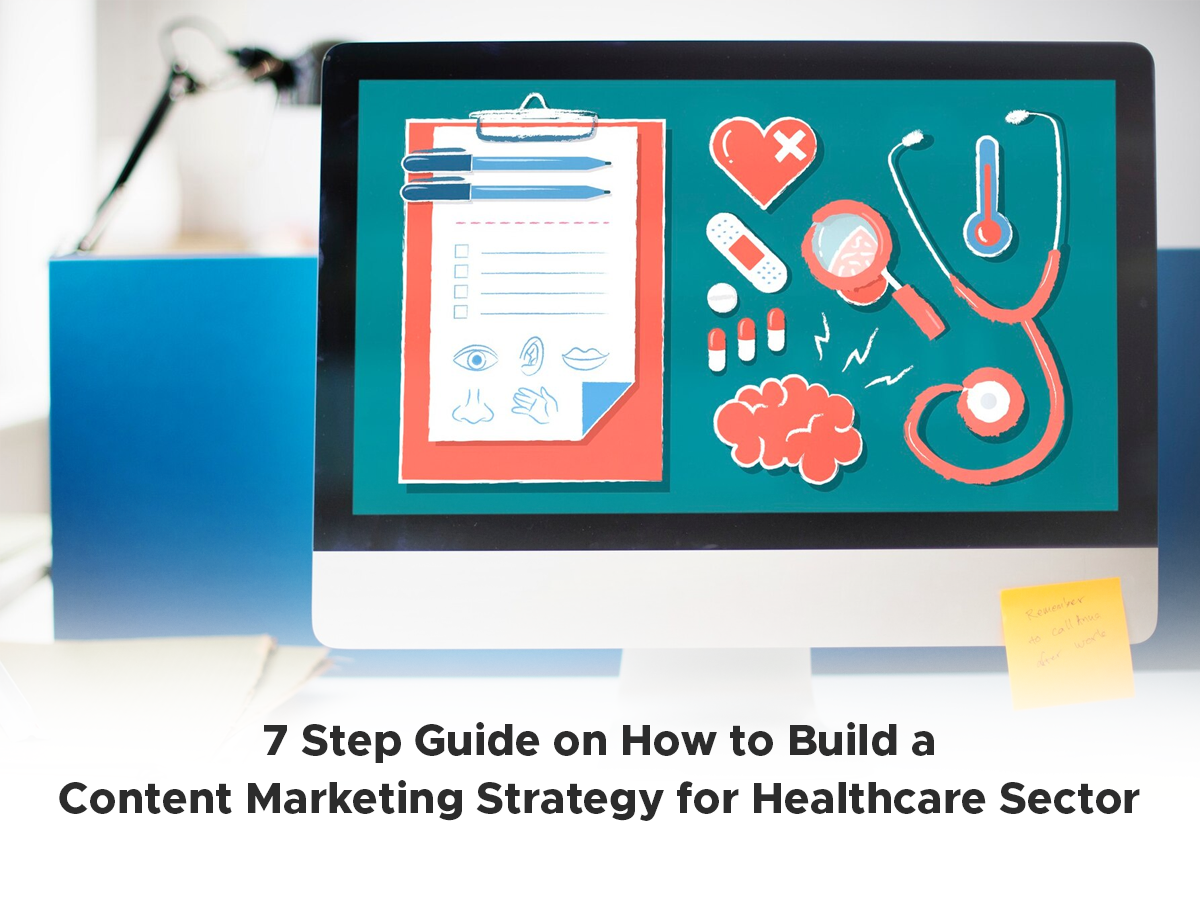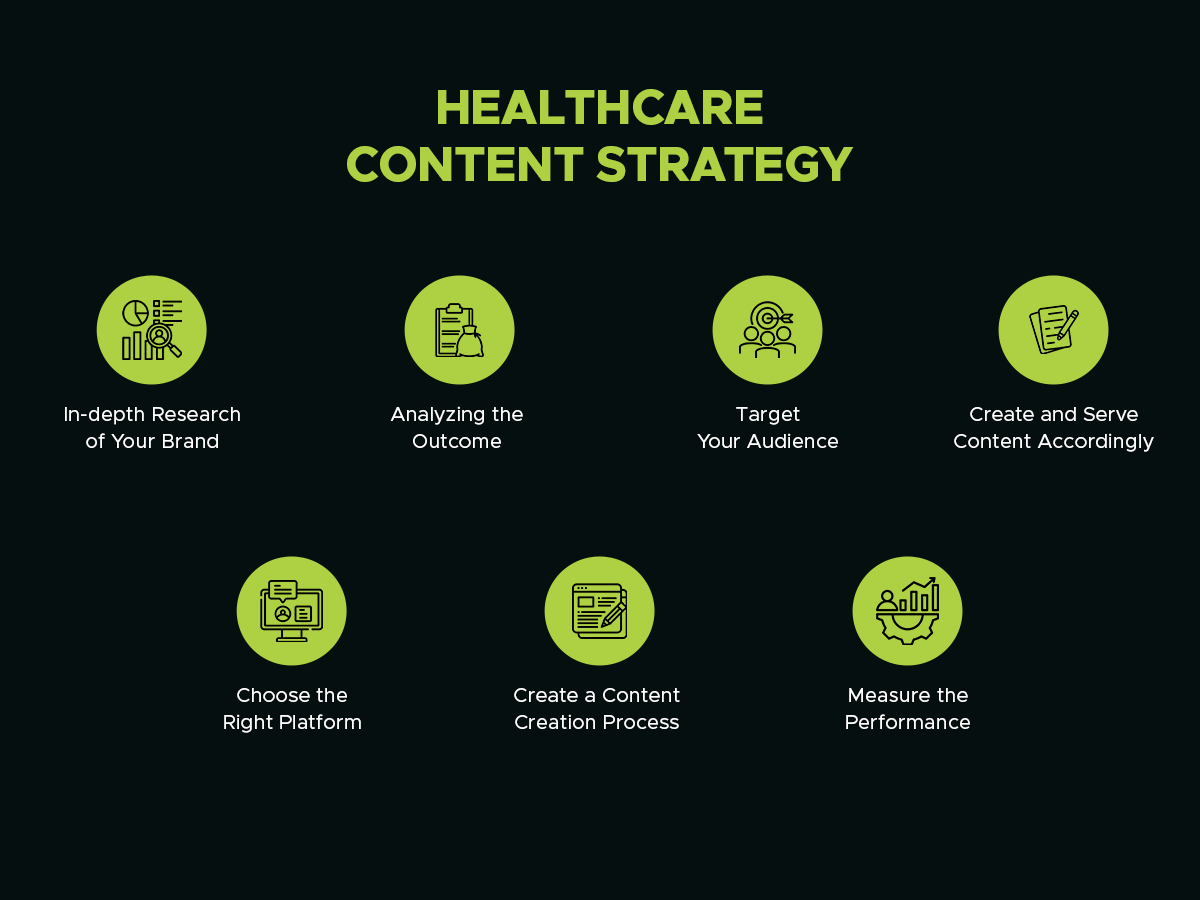- Enquiry For Sales: +91 7428094567
Enquiry For Jobs : +91 9116139991 - Request for quote
Blog

Around 80% of internet users are searching for health-related information online nowadays as per the research. To truly connect with modern audiences, healthcare providers must rethink their marketing strategies through the lens of an educated, discerning consumer. They expect easy access to quality content that educates, informs, and builds trust with brands. Thus, content marketing is growing as an essential tool for healthcare organizations to build brand awareness, attract new patients, and promote long-term relationships. A well-executed healthcare content strategy allows you to educate, inform, and engage your target audience while positioning your facility as a trusted authority. How does it work? Let’s figure it out.
Content marketing is the art of creating and sharing valuable information to attract and retain a target audience. It is about telling your brand’s story in a way that resonates with your audience, establishing trust, and building relationships. In healthcare, this could mean providing health tips, explaining complex medical terms, or sharing patient success stories. Before going into healthcare content marketing strategy, it is crucial to understand the value content marketing holds, especially for healthcare providers
Most of the patients start their healthcare journey online by conducting research
Quality content builds patient trust, confidence and loyalty
Educational content improves health literacy and outcomes
Personalized, targeted content drives engagement and retention
Content marketing attracts 3x more leads than paid search advertising

A strategic, insight-driven approach designed by a top healthcare digital marketing company enables you to educate audiences, build trust, and facilitate seamless digital experiences. Follow these seven key steps to craft an impactful healthcare content strategy tailored to your brand.
In-depth Research of Your Brand
Understand what your healthcare brand stands for. What are your core values, mission, and unique selling points? Knowing this will shape the foundation of your content strategy. Conduct thorough research to define clearly:
Clinical expertise and specialities
Patient demographics and communities served
Brand personality, messaging and value proposition
Competitors’ positioning and market share
This critical point illuminates your brand identity and how to best position content to attract your ideal audience.
Analyzing the Outcome
Define what success looks like. Is it more website traffic, increased appointment bookings, or heightened brand awareness? Setting clear goals will guide your content marketing efforts. Identify your primary objectives based on priorities like:
Building brand awareness and trust
Increasing patient volume for specific services
Enhancing patient education or health literacy
Boosting patient satisfaction and retention
With defined targets, you can build a strategy focused on achieving those goals.
Target Your Audience
Who are you speaking to? Identifying your target audience – be it young families, seniors, or individuals with specific health conditions – will help tailor your content to meet their needs. Some key considerations:
Age, gender, location and income level
Health conditions, challenges and concerns
Familiarity with medical terminology
Content consumption platforms and formats
The more you can segment and personalize content for your audience, the greater impact it will have on driving engagement.
Create and Serve Content Accordingly
Develop content that addresses your audience’s concerns, questions, and interests. From informative blog posts and engaging videos to helpful infographics and e-books, ensure your content is accessible and understandable. The right content nurtures them seamlessly at each stage, including:
Awareness (educational blog posts, guides)
Consideration (provider bios, facility details)
Decision (comparison charts, patient testimonials)
Follow-up (recovery tips, preventative care)
Map out the ideal content paths and touchpoints for different patient personas and goals. This patient journey mapping ensures they receive relevant, timely content.
Choose the Right Platform
Not all platforms are created equal. Determine where your audience spends their time – be it Facebook, Instagram, LinkedIn, or your website – and focus your efforts there. With audience needs and messaging pillars identified, build out a content library with various formats like:
Website pages and blog articles
Videos and podcasts
Interactive tools and assessments
Infographics and animations
Email newsletters and social posts
Patient stories and provider spotlights
Mixing content types caters to different consumption preferences while repackaging core messaging for maximum impact.
Create a Content Creation Process
Establish a workflow for content creation, approval, and publication. Having a process in place ensures consistency and quality in your content marketing efforts. Establish:
Content responsibilities and contributors
Approval roles and procedures
Editorial calendar and scheduling protocols
Repurposing plans and guidelines
Consistent, systematic content operations allow your team to collaborate seamlessly while maintaining quality and efficiency at scale.
Measure the Performance
Use analytics to track the success of your content strategy. Regularly reviewing your metrics allows you to adjust your strategy as needed to achieve your goals. Monitor areas like:
Website traffic and engagement rates
Lead generation and conversion rates
Email open, click-through and bounce rates
Social shares likes, and audience growth
Using these content intelligence insights, you can refine your strategy, double down on high performers and trim underperforming areas.
A well-executed content strategy for healthcare is not just beneficial; it is essential for healthcare providers looking to make an impact in today’s digital space. It is about more than just selling services; it is about providing value, building trust, and promoting long-term relationships with your audience. With Reinvent Digital – the best digital marketing company for healthcare, you can face the complexities of healthcare marketing and emerge as a trusted voice in the health and wellness space. Let us help you tell your story, engage your audience, and drive growth through strategic content marketing.
What types of content should healthcare marketers focus on?
Ans. A mix of website pages, blog articles, videos, infographics, email newsletters, and social media posts allows you to engage audiences across different platforms and content preferences.
How can healthcare content marketing improve patient outcomes?
Ans. By increasing health literacy through clear, simplified educational content, patients gain a better understanding of conditions and care needs – leading to improved adherence and outcomes.
What are the benefits of content marketing for healthcare organizations?
Ans. Key benefits include boosting brand awareness, attracting new patients, improving engagement and retention, and positioning your facility as a trusted industry authority.
How frequently should new healthcare content be created?
Ans. Consistent publishing is important, though frequency depends on your resources. Most experts recommend creating 1-2 in-depth assets per month, supplemented by lighter blog posts or social content 1-3 times per week.